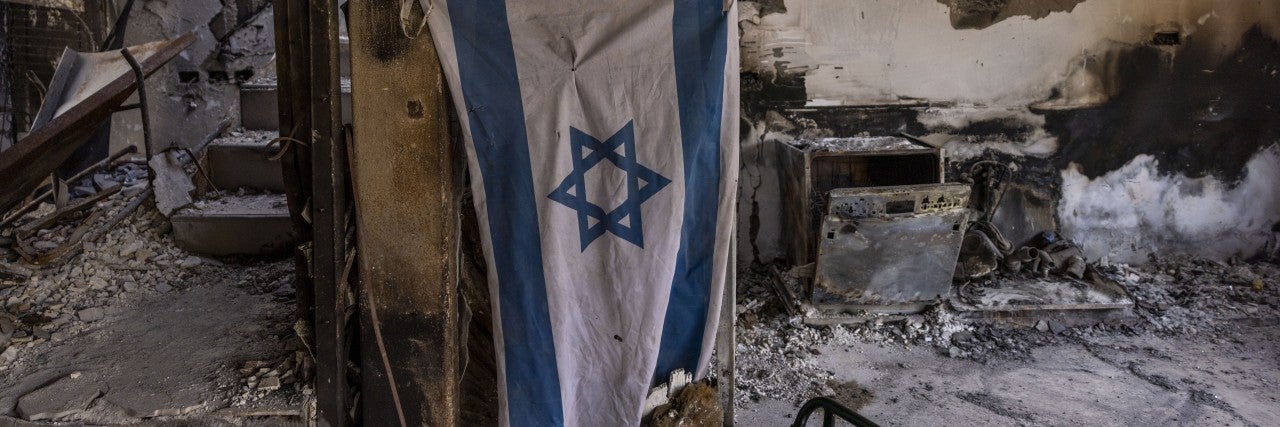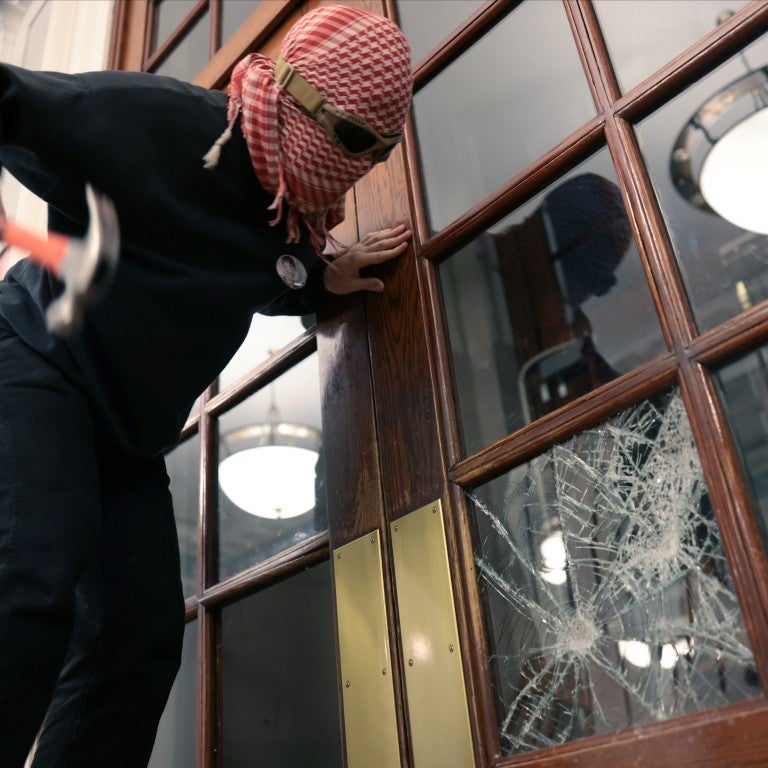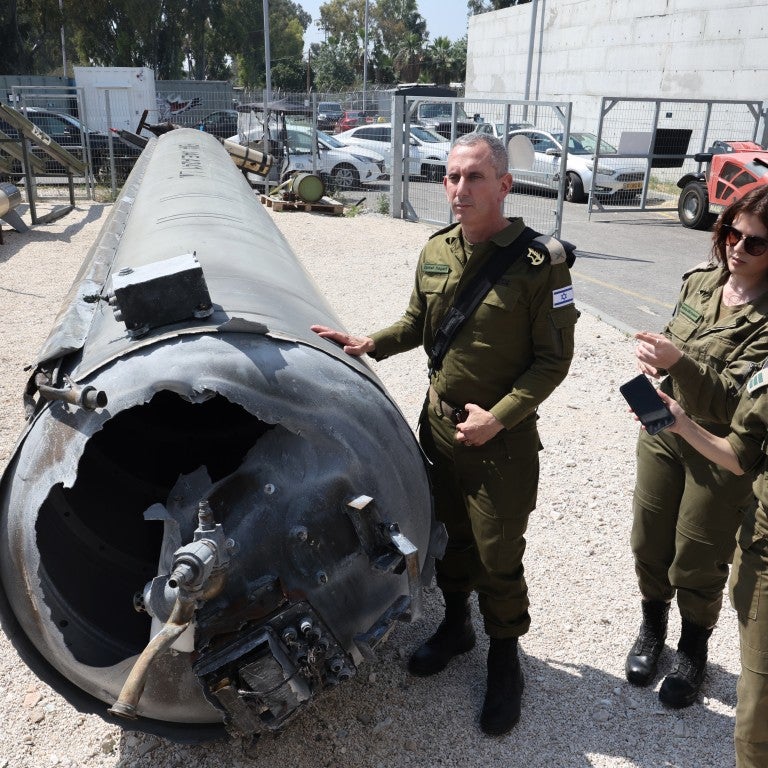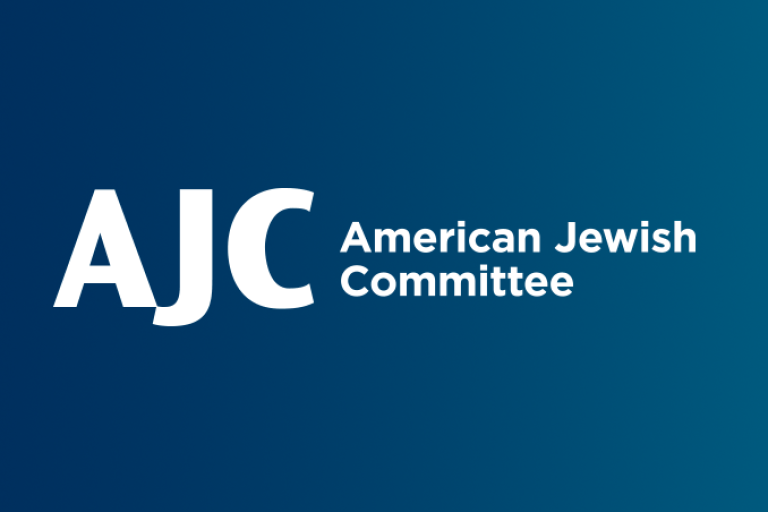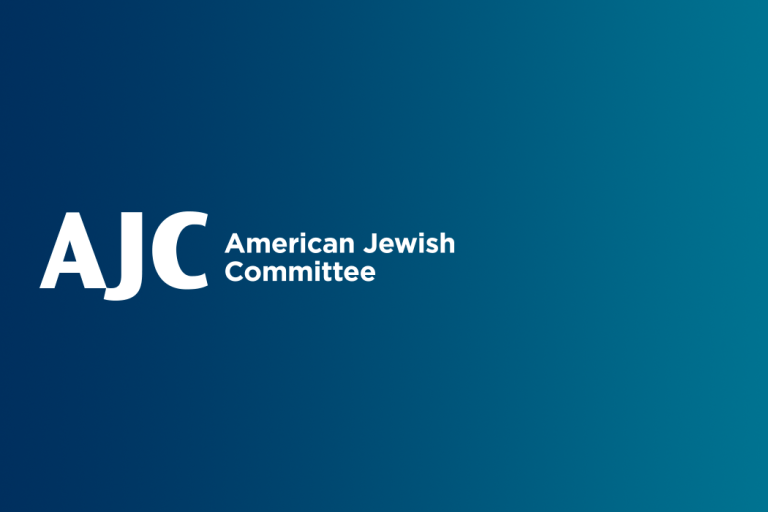December 28, 2023
Since October 7, the USC Shoah Foundation has added a new component to its mission: collecting the testimonies of those who survived the worst antisemitic attack since the Holocaust to counter those who deny it took place.
Dr. Robert Williams, Executive Director of the USC Shoah Foundation, joins us to discuss the history and tendency to deny atrocities committed against Jews, the importance of collecting testimonies, and how they help in understanding antisemitism in all its forms.
*The views and opinions expressed by guests do not necessarily reflect the views or position of AJC.
Episode Lineup:
- (0:40) Belle Yoeli
- (1:44) Robert Williams
Show Notes:
Take action to bring all hostages home now.
To support our work today, you can visit AJC.org/donate. Or text AJC DONATE to 52886.
Learn more:
Listen – People of the Pod on the Israel-Hamas War:
- 4-Year-Old Hostage Abigail Idan is Free–Her Family is On a Mission to #BringThemAllHome
- The Fallout from the University Presidents Congressional Hearing: What Does it Mean for Jewish Students?
- What Would You Do If Your Son Was Kidnapped by Hamas?
Follow People of the Pod on your favorite podcast app, and learn more at AJC.org/PeopleofthePod
You can reach us at: peopleofthepod@ajc.org
If you’ve appreciated this episode, please be sure to tell your friends, and rate and review us on Apple Podcasts.
Transcript of Interview with Robert Williams:
Manya Brachear Pashman:
Since the Hamas terror attacks on Israel on October 7, the Shoah Foundation has added a new component to its mission: collecting the testimonies of those who survived the worst antisemitic attack since the Holocaust to counter those who have dare to deny it took place.
Dr. Robert Williams is the Advisor to the International Holocaust Remembrance Alliance, where he served for four years as chair of the Committee on Antisemitism and Holocaust Denial. In October 2022, he became the Executive Director of the USC Shoah Foundation. Dr Williams is with us now to discuss the history and tendency to deny atrocities, in this case, those committed against Jews. Thank you for joining us.
Dr. Williams, if you could begin by explaining to listeners what Holocaust denial is, and how it's similar or different from Holocaust trivialization and distortion.
Robert Williams:
Holocaust denial is a little easier for us to wrap our heads around, for better or worse. Holocaust deniers are essentially trying to tell people that the Holocaust didn't happen for one of two reasons. The most obvious reason is because they're antisemitic, they want to tell people that the Jewish Diaspora writ large has come together to invent this grand conspiracy to pull the wool over the eyes of non-Jews for all manner of dastardly purposes. So that's the first reason.
The second reason is also antisemitic, although in a slightly different way. That is to rehabilitate national socialism as an acceptable ideology. No matter which way you slice that cake, it still ends up being antisemitism. That's why, to echo the words of people like Deborah Lipstadt, and others: Holocaust denial is antisemitism. Full stop. And it's a problem. It's something we need to deal with. But in our parts of the world, roughly speaking, the northern hemisphere, the West, it's become fortunately a bit of a micro-phenomenon over the last couple of decades.
The bigger problem is the second part of your question: Holocaust distortion, and I use the terms trivialization and distortion interchangeably. I prefer to use distortion. But Holocaust distortion is in essence, rhetoric that minimizes, confuses, or otherwise misrepresents the Holocaust, both as something factual, and something that has relevance today.
And that can take on a variety of forms, it can be something obvious like minimizing the number of victims, to something that's a little less obvious like figure skaters dressing up like concentration camp victims for their routines.
Now distortion also brings with it a challenge: is somebody distorting because they're cynical antisemites? Sometimes the answer is yes. Other times, distortion of the Holocaust happens because people don't know the facts, or they think they know the facts and they don't, and they end up saying the wrong thing.
But again, the end result, no matter the motivation, becomes problematic. Because if you are misrepresenting the Holocaust, you are effectively doing two things. On an ethical plane, you are disrespecting the memories of the victims and the survivors, and that's wrong. And on a practical plane, you are opening the door. I like to say Holocaust distortion kind of acts like a gateway drug to outright denial, to conspiracy thinking, and to more dangerous forms of antisemitism. So you have to tackle distortion, but you tackle distortion often in ways different from that of denial.
Manya Brachear Pashman:
But rather than focus on the word Holocaust, I want to focus on the word denial. You mentioned Deborah Lipstadt, for example, and she recently expressed concern that people are denying that Hamas committed so many heinous crimes on October 7.
Is this a phenomenon, this denial of atrocities – do you see it more applying to atrocities against Jews? Or have we seen it in other instances?
Robert Williams:
Well, we’ve certainly seen it in other cases of mass crimes and genocides. One of the most prominent cases that predates the Holocaust is denial of the genocide of the Armenian people in the early 20th century, something that persists in certain parts of the world and is part of official state policy in some countries. Denial of the Armenian Genocide is problematic for a whole host of reasons. First, again, it's immoral visa vie the victims and survivors of that particular genocide to deny their experience, to say it never happened, to minimize it. It also has inhibited global understanding of Armenian life, history and culture since the genocide happened.
So denial of mass atrocity crimes is something quite common when it comes to the denial of crimes against the Jewish people. You do see this over and over over and over again, though, you see, either excuses for the various pogroms that have claimed the lives of hundreds of 1000s of Jews over the centuries, or an attempt to minimize it, or an attempt to suppress that history. And that's separate from the denial and suppression of Holocaust history that we've seen through time. And we have seen, not just in the case of the October 7 attacks, but denial of other atrocities that were carried out against Jews through various forms of anti semitic terror violence. But we've definitely begun paying attention to it after October 7, in part due to the scale, you know, the largest act of anti semitic violence against the Jewish people since 1945. In the one place where it was never supposed to happen, people were supposed to be safe.
And the international community, you know, you're used to seeing these claims of exaggeration or outright denial from certain countries in the Middle East or North Africa, but this is become widespread. Think within, was it a week, nine days after that horrible series of attacks, with people asking to see photographs of the murdered children, because they didn't believe that. So engaging in very dangerous, I would say almost pornographic rhetoric, about violence against the most innocent among us. And engaging in it in a way that encourages denial encourages doubting the veracity of these crimes, or–and we've seen this in other corners as well since October 7 –rhetoric that in turn moves from denial to outright justification for the atrocities that were committed. It's very tricky. It's not black and white. Unfortunately.
Manya Brachear Pashman:
Does social media amplify Holocaust denial, and are we seeing that same trend now with the October 7 attacks? You talk about it being a post-truth world.
Robert Williams:
I absolutely think that's the case. Although I will say, outright denial on social media. Again, it's there. It's a problem, but it's less common than distortion and intentional manipulation. You know, I think even the term Holocaust distortion is potentially problematic, we're probably better served calling it Holocaust disinformation. And I think we're seeing some of the same dynamics at play in the post October 7, discussions that we see in online forums, including closed forums, in places like telegram or Gab or Discord, as well as in more public facing ones like X and Instagram and Threads.
Manya Brachear Pashman:
Before we leave the topic of denial, and move on to distortion, because I do want to explore that a little bit more. I do want to ask about the role of Holocaust denial in the Israeli-Palestinian conflict. Palestinian Authority leader, Mahmoud Abbas, he wrote his dissertation at the University of Moscow denying the Holocaust happened to the Jews, that it was more of a product of the Jews’ collusion with the Nazis. Is that a belief that is common among Palestinians or pro-Palestinian supporters. What role does that piece of disinformation play in exacerbating the sentiments?
Robert Williams:
There's a lot to unpack in that question. I'm going to start with the caveat that I'm a specialist on Europe, not a specialist on the Middle East. So a lot of my understanding of dynamics around distortion and denial among non Israeli Palestinians is anecdotal, and based on secondary literature.
But it does seem that there is a current in some parts of the Palestinian culture where denial of the Holocaust is known to the degrees to which it's accepted, or probably vary from time and place. And it makes a certain amount of sense. Because if you can deny the reality of the Holocaust, you can then point to the State of Israel and say, the Jewish people who've never been victims were the eternal victim. It's much easier to be a victim when you’re in a complex political world anyway.
The more interesting thing is the origins of the Abbas dissertation, and how it's managed to spread across at least the Arabic speaking and Persian speaking worlds. To a certain degree, it's something that has been generated in Muslim society. But as scholars like Jeffrey Herf, have shown certain elements of antisemitism spread from Europe in the case of Professor Herf’s work, from National Socialist Europe to parts of the Middle East, and then those forms of antisemitism spread.
And as the works of people like Isabella Taparofsky have shown, particularly in the case of the Abbas dissertation, a boss wrote that dissertation in the Soviet Union and at a time when the Soviets promoted through international propaganda schemes and domestic propaganda, virulent, dangerous forms of anti-Zionist antisemitism, that also included trafficking and Holocaust denial.
So the origins of it came from the Cold War, policies and practices, to a certain extent, of the Cold War policies and practices of the regime that no longer exists. A regime that sought to undermine democracy, sought to undermine solidarity in the western world sought to undermine the State of Israel, well throughout its history. And there's no acknowledgement of that.
So if we're going to root out Holocaust denial, no matter where it lies, we have to begin with its origins. And those origins vary from time and place. Some of the origins lie in the National Socialist experiment. The Nazis had all manner of terms and actual formal programs to cover up their crimes. Some of those origins lie with certain French intellectuals, certain origins lie with American public figures in the 1940s. And some of the origins lie in the Soviet Union. We need to know the enemy top to bottom if we're ever going to deal with.
Manya Brachear Pashman:
I want to move on to distortion. And I'm curious if the kind of distortion that we're talking about that is common now on social media and in conversations, especially those around October 7, does it tend to be a far right phenomenon, far left, pretty universal?
Robert Williams:
So Holocaust distortion, the trends have shown, cuts across all ideological, social, cultural, political and religious barriers. Now, certain forms are more common to certain groups at certain times, the forms of distortion that minimize the number of persons murdered during the Holocaust, for example, or claim that the Jewish people did something to deserve the Holocaust. Those have typically been more common on the far political right. And among some religious conservative extremists. Some of the forms that suggest that the Jewish people make use of the Holocaust for all manner of gain, everything from funding to guilt to special protections, to justifying the State of Israel – pretty much cut across the left, right divide.
Certain leftist forms of Holocaust distortion through antisemitism that have emerged at least since the Second Intifada, take the form of the Jewish people using the Holocaust to justify the State of Israel or the policies of the Israeli government. But by and large, distortion of the Holocaust is unfortunately a phenomenon that is everyday. It even takes the form of particular types of commercial distortion, people engaging in it without any ideological agenda.
One need think of the unfortunate situation that seems to happen every couple of years where Anne Frank Halloween costumes go up for sale in the US or in the UK, or when Chinese made ornaments depicting Auschwitz Birkenau become up for sale on on Amazon or even I think it's still possible today to buy model kits and toys of Hitler and his inner circle. People who make the subject so blase and everyday that it loses its power. That's a different form of distortion, stripped of ideology.
Alright, October 7 distortion at first, and again, I'm an historian, so I like to have a wealth of evidence before me. But based on early observations and research, those forms of distortion and denial that emerged often enough were associated with in the Western world, largely the political left, and certain forms of protest movements that either had shared affinity with the Palestinian cause or would be affinity with the Palestinian cause.
But what we've seen over the last couple of weeks is that is no longer the plaything only of the political left. We have seen some people on the extreme right begin engaging in similar rhetoric. Now, there's no sympathy being given to the Palestinians in that rhetoric, but claims that the State of Israel is making too much use of this, or the Jewish diaspora is using this for all manner of bad things. So it is beginning to cut across those boundaries that we've seen.
Manya Brachear Pashman:
The Shoah Foundation holds the world's largest video collection of Holocaust survivor and witness testimonies. And it has now begun collecting video testimonies of the atrocities committed by Hamas terrorists against the Israelis on October 7. Why?
Robert Williams:
So I assumed the leadership role here at the Shoah Foundation about 13 months ago, and I was brought here to establish a robust initiative focused on antisemitism. The Shoah Foundation was created as a platform so that the voices of Holocaust survivors could echo for future generations, and moreover, lead to a better world. In a sense, we engage in wish fulfillment. Survivors gave us their testimonies to bring about the world they wanted. And when you get right down to it, survivors wanted only a few things. One of those things, I guarantee you, was a world without antisemitism.
So we have an obligation to those survivors to try, especially before the last of the survivors leave us, to create the conditions to bring about that better future. So we had been developing this laboratory, this multi-subject expert initiative that would deal with antisemitism as it’s existed since 1945.
And we were going to start, we are starting, with the development of a massive collection. Our minimum goal is 10,000 testimonies of antisemitic violence in a variety of forms. And we broke, we broke that into five categories. One of those categories was the survivors of antisemitic terror attacks. Several months ago, we thought, alright, we're gonna focus on this, our starting point is going to be the 1994 bombings in Buenos Aires. We're going to work our way forward.
And then October 7 happened. So we had to swing into action immediately. Within 12 days, we had secured the first testimony on the ground. This was possible thanks in part to our already existing work in Israel and our strong partnerships with Israeli institutions, including the National Library of Israel and Yad Vashem and others. The Ghetto Fighters House as well. And very quickly utilizing our on the ground teams, our partnerships, we began to acquire testimonies using the same methodology that we did in the 1990s when we started taking Holocaust survivor testimonies.
And a few things became readily apparent to us. One is just the simple tragedy, and the painful irony of this endeavor. In the 1990s, when a survivor came and gave us her testimony, the first thing you would see is a sheet. The survivors name, the date of the interview, the interviewer’s name, some basic information. And we're seeing the same thing when we look at survivors of the October 7 attacks.
There's true tragedy there. We've secured as of the date, as of today's recording, a little more than 250 of these testimonies. They will be put online for free, I think we have about 70 or 80 online right now. We have a partnership with some media partners, including Tablet Magazine here in the United States to make them even more available, and they will be made available to our Israeli partners for use, because this is the history of Israel and its people now.
But our goal is to use these here, so that we can begin training people from a major university, how to understand antisemitism in all its forms and how to build resilience against it, how to research the subject on a deeper level, how to write better journalism around the subject, and how to respond and recognize that the victim of antisemitism is not some faceless person or somebody who lived eight or so decades ago. Somebody today, just like you, just like me, just like our children, or our parents.
Manya Brachear Pashman:
Before we share a clip of one of the survivors from the Shoah Foundation's October 7th Testimony Collection, I want to give listeners a chance to turn down the volume or fast forward. These testimonies are incredibly painful to listen to.
This is a portion of testimony from Shaylee Atary Winner, from Kibbutz Kfar Aza, who hid for 26 hours with her newborn daughter [Shaya]. Her husband, Yahav, was killed.
[Portion of testimony from Shaylee Atary Winner]
Manya Brachear Pashman:
The voices and stories of the survivors are always so difficult to hear and even the bravery it takes to recount these horrors is so hard to fathom. We are talking about people who dare to deny these horrors happened. This collection serves to counter those attempts, right?
Robert Williams:
That's correct. There's a lot of, as we all know, the Israeli government pulled together GoPro and other footage captured from the terrorists. There's a lot of security camera footage. A number of teams have gone in, including a group at Reichman University, doing 3D scans of the atrocity sites. The physical record of this is astounding. So far, I've heard different numbers, I don't want to give a precise number, let's say tens of 1000s of videos have been made. And we're only just beginning to understand it.
Manya Brachear Pashman:
We’re going to share another clip here. This is Maor Moravia, a 37-year-old father of two, on returning to Kibbutz Kfar Aza after the October 7 terror attacks.
[Portion of testimony from Maor Moravia]
Robert Williams
That the best way to counter denial and disinformation is to hear it from those who lived it, to see their experiences. And will that convince everybody? No. Those who don't want to be convinced, those who have an agenda will always be a problem. Our job is to make sure that we have this content and are reaching audiences who are vulnerable to being radicalized, vulnerable to becoming extremists, before that happens. And we're seeing that happen in a variety of spaces right now. So we have a big job to do.
Manya Brachear Pashman:
Rob, you mentioned being there at USC. Our December 14th episode was tied to the congressional inquiry of university presidents regarding antisemitism on college campuses. Have the students and faculty at USC taken advantage of The Shoah Foundation's presence there on campus? It seems like such a great resource, as long as people are actually utilizing it.
Robert Williams:
Yes, I'm very proud to be at USC, especially right now. You know, the university president has been in regular contact and dialogue not not just with us, but with Hillel, with Chabad, with the Jewish students, with the Religious Life Center, with faculty across this massive University of 22 schools. Beyond that, the Shoah Foundation has been in dialogue with different departments, including the School of Social Work right before we started this podcast.
Now it had been planned in advance of October 7, but a couple weeks after October 7, we here at USC, along with our partners, and Hillel International, AJC, the local Federation, brought university administrators from across the west coast to our campus, for one reason: to learn about antisemitism and how to respond to it within a university environment.
Now, we haven't crowed about this. We're just doing the work. But I think the fact that we have strong leadership from the top, we have a peerless institution in the USC Shoah Foundation here, literally in the middle of the campus, has protected us against some of the unfortunate trends that we've seen on campuses and other parts of the country.
Manya Brachear Pashman:
I mean, I could see being in any kind of a protest environment and hearing vile things come from the students mouths and pointing to the to your facility and saying, look over there, go in there.
Robert Williams:
Yeah, well, and to a certain extent that has happened. You know, we do have regular outreach to students over the summer is part of the build up to our antisemitism programming, we took a significant number of the student athletes from USC’s track and field team, a track and field team that has more Olympic gold medals than most countries, to our offices for a week of training on how to understand antisemitism in all of its forms.
And while they were here, they met with local Jewish community representatives, of course, our staff gave lectures as you would expect, we brought in virtual, or by remote, a very well known survivor of the Holocaust, Shaul Ladany. Mr. Ladany, for those who don't know, is one of the most remarkable and sweetest people I've ever met.
He's a survivor of the Holocaust, who made his way to Israel, became an Israeli athlete. As he told me, he felt he wasn't a fast enough marathon runner. So he became a speed walker, and entered and became part of the Israeli Olympic team in 1972. And he was one of the first athletes to escape the dormitories during that horrible, horrible tragedy.
So he spoke to these athletes in his sport. After that, we took them to Poland, but we didn't take them to Poland just for the reason everybody would expect. We started in Krakow, where the students learned about a thousand years of Jewish life and culture, from its origins to its challenges to its almost Renaissance today. To learn about something more than just the Shoah.
They did, of course, visit Auschwitz Birkenau to learn more about the Holocaust. And they walked away from this program. more aware of the antisemitism in their midst. One student said something along the lines of, ‘I didn't realize I was engaging in distortion of the Holocaust until I took part in this program.’
And some of these students after October 7, started emailing us again, ‘I'm hearing this, I'm hearing that, how do I respond to my friends?’. So our staff is working with them. And this is an important leadership group. This is a program that we have to continue engaging in. It will have an effect now, but I guarantee in a generation, it will have such an impact that we might start turning the tide because things have gotten so out of control in every other way.
Manya Brachear Pashman:
Rob, thank you so much for joining us and having this conversation.
Robert Williams:
I appreciate it Manya. Thank you.
Manya Brachear Pashman:
If you missed last week’s episode, be sure to tune in for my conversation with Liz Hirsh Naftali whose great niece Four-year-old Abigail Mor Idan, returned home during a pause in fighting in November. The youngest U.S. citizen to have been kidnapped and held by Hamas, Abigail and her siblings are now orphans after Hamas murdered their parents. Hear about her family’s continuing effort to bring the remaining 129 captives home to their loved ones.
